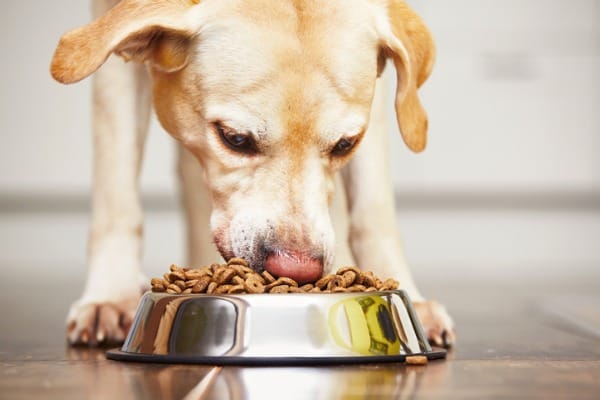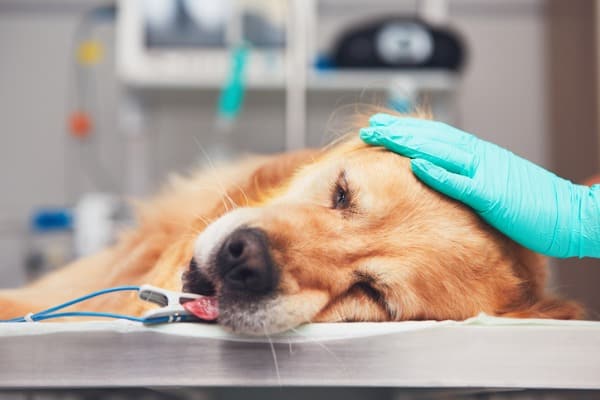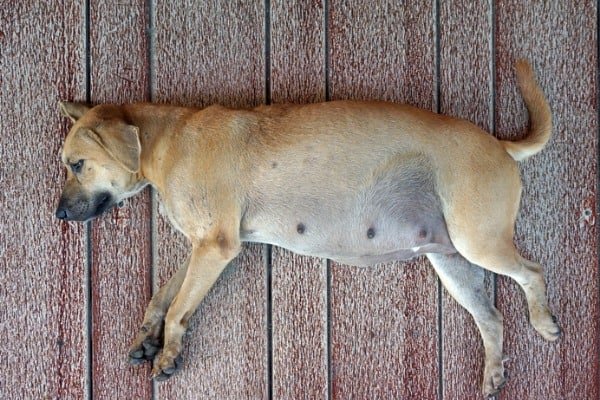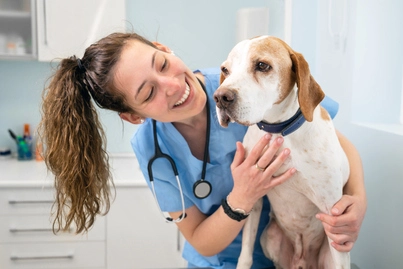The food dish is full at mealtimes, and it’s practically licked clean by your dog at the end of the meal.

Yet, your dog or puppy doesn’t seem to be maintaining a normal weight.
It’s a worry:
This is naturally an alarming development and something that sparks stress in dog parents.
It’s an issue you want answers to sooner rather than later – before your beloved pet wastes away.
A dog losing weight but acting normally, and eating normally, usually has an underlying health problem or an issue with their diet.
Is it a serious issue?
Not always – but it is necessary to rule out serious causes and find a solution to your dog’s weight loss.
We’ll cover some of the reasons your dog could be losing some weight and some things you can expect to encounter at the vet as they search for a diagnosis.
Let’s find out more.
Turning to the Vet if Your Dog Is Losing Weight
How do you define weight loss in dogs that are cause for concern?
If their diet and exercise routines haven’t changed, but they lose 10% of their body weight or more in a short period of time, it’s time for them to see a vet.
This is a problem we don’t recommend you attempt to self-diagnose or treat at home for two reasons.
What are they?
The first reason is that while rare, some serious health issues can be the culprit for your dog’s weight loss.
It’s critical to get to the bottom of these ailments and start treatment soon for the best prognosis possible.
The second reason is that even if the issues aren’t serious, they can require medications and treatments that can only be overseen by a trained vet.
Connect with a verified veterinarian in minutes. No waiting for appointments or office hours. No high fees. Your pet's health made convenient and worry-free.
Below is a list of a few causes of weight loss that require swift vet care.
1. Heart Disease
Although dogs with heart disease might experience weight loss due to a lack of appetite, they can also have inexplicable weight loss as a symptom.
It might be scary to learn there isn’t a cure for heart disease, per se.
However, it is a manageable condition, and dogs who are being treated for it can still live full lives.
The crucial part is getting a vet’s diagnosis so a treatment plan can begin.
2. Cancer

It’s a terrifying thought and one of the reasons you should have your dog tested if they have weight loss for no reason.
The clock is ticking when it comes to cancer, and the sooner your vet can narrow down the type and stage of the disease, the better.
Fortunately, advances in veterinary medicine make it more viable than ever to successfully treat a variety of cancers in dogs.
3. Disease of the Liver or Kidneys
If your dog is suffering from an issue with their liver or kidneys, they might lose weight even if they eat normally.
The weight loss can be chalked up to chronic diarrhea and vomiting that often accompany these issues.
Their eating might seem normal, but if they can’t hold onto their food long enough, they’ll obviously be losing weight.
Either of these issues can be treated, but again, need to be diagnosed as soon as possible.
4. Gastrointestinal Obstruction
Dogs sometimes swallow things they shouldn’t – and they can become trapped in the digestive system.
Your dog can continue eating regularly, but a foreign object somewhere in their digestive tract can prevent nutrients from being absorbed properly.
Obstructions can also become dangerous if they cause internal perforations or obstruct parts of the stomach and intestines entirely.
So even if part of a toy or clothing has been hanging out in your dog’s stomach for a while without any serious issues arising, it’s essential to get it removed before it causes bigger problems than weight loss.
5. Muscle Atrophy
Reduction in exercise and old age are common causes of muscle loss in dogs.
They can continue to eat normally but seem to shrink before your eyes.
They may also feel unusually bony and lean.
Muscle atrophy in dogs can have some other causes that require attention from a vet.
Parasites: The Ugly Truth
Dogs can pick up intestinal parasites very easily if they aren’t on preventive medication.
A puppy losing weight but eating has a high risk for parasites, as they are easily spread and young puppies cannot receive preventive medications until they reach a certain age or size.
While a minor to moderate infestation won’t put a puppy or dog in any immediate danger, it’s a problem you don’t want to ignore.
Several parasites can cause weight loss in otherwise healthy dogs.
Put down the food. You won’t want it after reading this.
1. Roundworms
These nasty, spaghetti-like creatures can infect dogs, cats, and even people. It’s a common infection in children as well as dogs.
Other symptoms to look out for besides weight loss include vomiting, diarrhea, and coughing.
A cough develops when the ingested parasite eggs hatch, causing the dog to swallow newly-hatched worms.
2. Coccidia
They’re common in puppies and make their home in the GI tract.
They’re microscopic, so you won’t be tipped off to infection by seeing one in your dog’s vomit or fecal matter.
Coccidia can cause severe diarrhea in some cases, exacerbating weight loss.
3. Hookworms

The nature of this parasite can cause some severe malnutrition effects in infected dogs.
It’s not just nutrients they steal from their hosts – it’s also blood.
They attach to the walls of the intestines and contribute to anemia as well as weight loss.
Lethargy and diarrhea are common symptoms of this type of parasitic infection.
4. Tapeworms
Thank fleas for this parasite. At the early stage of its life cycle, a tapeworm lives inside fleas.
A dog or cat who swallows an infected flea will then become host to the tapeworm as it matures.
This often happens during grooming or when your dog snaps at a flea that is biting them.
Countering Parasite-related Weight Loss
Lost your appetite after reading that?
Us too.
Luckily, parasites don’t usually affect a dog’s appetite unless the infection becomes severe.
That makes being able to treat your dog before an infestation reaches that phase all the more important.
It takes some time:
You can’t expect your dog to put weight back on until the parasites are gone.
A deworming treatment that your vet will prescribe is the first step in getting your dog’s weight back to normal.
The parasites listed here – and others your dog might have picked up – can be defeated by treatments as long as you follow the vet’s orders.
Once your dog has completed their deworming regimen, they should start to put weight back on normally.
Dealing with one parasite infestation is usually enough to remind pet parents that preventive medications are well worth it.
When Diet is to Blame
A dog could be gobbling up their food but losing weight because the food isn’t right for them.
They might eat it anyway because it’s delicious to them or because they’re simply hungry.
A few diet blunders can lead to conditions in which a dog will lose weight.
1. Malnutrition

This issue can arise from feeding the wrong dog food with not enough nutrients or not feeding the right quantity.
Dog food brands come with helpful guidelines regarding how much to feed daily, depending on the size of your dog.
If that doesn’t seem to be working, a vet can help you tweak your dog’s food, and amounts thereof, to ensure they’re getting enough calories and nutrients.
Keep in mind that active dogs will have higher caloric requirements than more sedentary ones.
Make sure you adjust your dog’s diet anytime their exercise routines are also switched up.
Some pet parents choose to feed alternative diets, such as homemade dog foods or vegetarian meals.
The latter option is something that, if you must do, you should only do under the strict guidance of a vet.
It’s not something you should attempt based on your own research, as it can cause deficiencies and malnutrition.
What is the problem with restrictive diets for dogs?
There are substances they can only get through meat and meat-based protein – and those things must be supplemented in a DIY diet.
Getting some of these nutrients through supplements rather than via the natural source might not be enough, either.
There’s still a question of whether dogs can actually absorb the necessary amounts of nutrients when they’re given to them supplementally.
Feeding “raw” food diets are a little easier, provided you include things like meat, eggs, and fish.
It can, however, be tricky to figure out how to translate proper nutrition and caloric amounts from kibble to homemade meals.
Again, asking your vet for specific amounts and volumes of raw foods will help avoid malnutrition issues in your dog.
2. Malabsorption
Your dog can be eating but still losing weight because their small intestine isn’t properly absorbing all of the “good stuff” from their food.
What causes this to happen?
A variety of issues can lead to the malabsorption of food.
Exocrine Pancreatic Insufficiency
Also known as EPI, this condition arises when there are not adequate numbers of digestive enzymes produced.
This will lead to a variety of gastrointestinal issues and can also cause severe weight loss if left untreated.
Enzyme replacement is effective and sometimes the only treatment necessary to correct this issue.
Inflammatory Bowel Disease

Inflammation of the bowel lining isn’t unique to humans.
A dog suffering from IBS can have chronic diarrhea leading to weight loss – without losing their appetite.
Chronic diarrhea also can cause foods to work through the system before the small intestine has a chance to absorb anything worthwhile from it.
IBS can be caused by food allergies, stress, lack of sufficient fiber, and bacterial infections, to name a few.
It is sometimes a mystery what exactly triggers IBS in any mammal.
Luckily, if the underlying cause is discovered, it is fairly easy to treat. Even if the root cause can’t be identified, there are treatments to help manage the symptoms.
Small Intestinal Bacterial Overgrowth
SIBO can prevent your dog’s small intestine from receiving essential nutrients from food.
What is a small intestinal bacterial overgrowth, and what causes it?
Simply put, the bacteria needed to break down and set the stage for healthy, normal digestion can sometimes grow out of control.
It can happen as a side effect of other health issues, or it can have no apparent cause.
Allergies
Sensitivities or allergies to certain foods can prevent your dog from absorbing anything good from them.
Food-sensitive dogs might fully enjoy eating food that doesn’t agree with them.
They might also throw it up or have diarrhea before they can digest it.
There are other things to look for:
Other symptoms of food allergies in dogs include itchy skin and hot spots, which are uncomfortable enough.
Weight loss due to allergies is a good indicator that your dog’s diet needs to be revamped.
Aging Canines Who Lose Weight
Although we might not like to face the signs that our dogs are getting older, weight loss for no apparent reason is a common sign of aging.
Elderly dogs can be every bit as enthusiastic about food as they were in their youth but don’t seem to be holding their weight very well.
This can be due to health issues related to age, but it can also be purely because your dog is biologically old.
Many health issues that older dogs are susceptible to that also cause weight loss have a clear cause – loss of appetite.
So if your dog is still eating, it can seem difficult to narrow down why.
We mentioned earlier in this article that there are some serious health issues that need to be ruled out when a dog suddenly loses weight.
While it is true that some of these diseases are more likely to strike elderly dogs, it is also true that old dogs are more prone to weight loss and muscle atrophy simply due to age.
Dig a little deeper:
Look out for other sneaky symptoms such as pale gums, increased thirst, yellowing of the eyes, or excessive urination.
It sometimes can seem like a dog is otherwise normal aside from losing weight, but there are some symptoms present you might not have noticed easily.
These symptoms can indicate kidney failure, liver disease, and diabetes – problems that older dogs are at a higher risk for.
Pregnancy in Dogs

Eating without maintaining weight could be an indicator your dog is expecting a litter.
You might have had her go missing for a few hours during the heat cycle, or the pregnancy could be a planned one.
Maybe you rescued a stray who could be pregnant.
No matter what the case, losing weight means the puppies are taking up all the nutrients mom is getting from her food – and there’s not enough left over for her.
You need to take action:
Pregnant dogs need to increase their calories and other nutrients, so if you suspect your dog is pregnant, get it confirmed by a vet.
If your dog is carrying a litter, she’ll need an adjustment in her diet to prevent further weight loss – and negate risks to the puppies she’s carrying.
The Causes of Weight Loss When Appetite is Normal
Why is my dog losing weight but still eating?
There are many possibilities, ranging from serious to minor – but most of the causes require some help from pet parents or vets.
The essential thing is:
Get an answer to this question sooner rather than later. It’ll give you some peace of mind to know exactly what you’re dealing with.
Also, the sooner you can figure out the cause and get your dog’s weight back to healthy, the better.
Once your vet has helped you understand the reason behind the weight loss, you can make whatever adjustments necessary to maintain your dog’s health.

